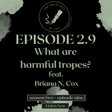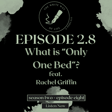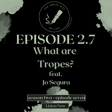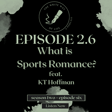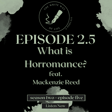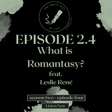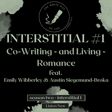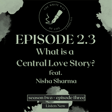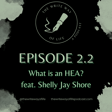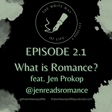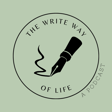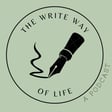Become a Creator today!Start creating today - Share your story with the world!
Start for free
00:00:00
00:00:01

"What is Stakes?" featuring Jen Ferguson - Episode 10 - Season One - The Write Way of Life
Jen Ferguson, author of award-winning YA novels like The Summer of Bitter and Sweet and A Constellation of Minor Bears, chatted with us about stakes this week. Well, that was the initial premise…listen in to learn the incredible insights Jen shared about stakes, conflict, and how to keep your readers hooked! Leave us a comment or a review to be featured on the podcast! Or email us, send us an Instagram DM, or otherwise contact us with craft questions you’d like to hear answered!
Find Jen Ferguson online.
Check out Jen’s books.
Follow the podcast on Instagram or on our website.
Follow Karis on Instagram.
Follow Adi on Instagram.
Transcript
00:00:01
Speaker
Hello, hello.
Introduction and Co-hosts
00:00:02
Speaker
It's me, Karis Rogerson, one of the co-hosts of the Right Way of Life podcast. And I'm here with my co-host, whose name is... A.D. Giletta, a.k.a. Addie.
00:00:14
Speaker
And we are talking... That was shitty. We're doing. was like, what are we talking about? Oh, we're doing an intro. This is what happens when I try to lead the conversation. i yeah look at we're supposed to be talking about and be like, we're supposed to be talking about words.
00:00:33
Speaker
and bru so Words are always what we're talking about. Let's be real.
Addie's Wedding Adventure
00:00:38
Speaker
um Where are you, Addy? Because I know you're not in your normal space. I am not. I am at a friend's wedding.
00:00:44
Speaker
um They're doing a whole like four day extravaganza. um It's actually really cool. So that's awesome. I'm yeah currently in the basement of a lodge that used to be a Girl Scout camp and is now a wedding bed meal. What?
00:00:59
Speaker
Lit. I love that. um It is June 13th. It Friday the 13th. So go us. Love that for the world.
00:01:11
Speaker
It's in the morning, so we don't know what's going to happen today. It could be wild. The fan is already blowing shit everywhere because the shit did hit the fan. i Honestly, I think the the fan's on fire at this moment and we're being pelted by um burning shit.
00:01:27
Speaker
Yeah. Oh, God. Okay, so on that note, let's bring some joy to the world.
Reading Challenges and Preferences
00:01:33
Speaker
What have you been reading and writing lately? um I have been reading, ah i don't i don't remember what I said I was reading last time. Probably a lot of ah lot of like romantic fantasy. I'm still on that still on that binge.
00:01:47
Speaker
um I'm stuck on the third book of this. it's not This is not a romantic fantasy. i sort of like pivoted away to more like and like fantasy real or whatever whatever the one that is, not predominantly a romance with a little fantasy in it.
00:02:03
Speaker
Gotcha. Yeah. So I'm trying to get you through that third book, but the author has done a bit like a very good job. Like from a crack perspective, I love what's happening. From a reader perspective, I am in a fragile emotional place and I can't finish the book can because I can't see a world that both of my favorite couples get a happy ending. Oh no!
00:02:26
Speaker
So, I mean, it's beautifully done because like the the author in the second book um added this additional point of view character that who was sort of shrouded in mystery. Didn't know if it was happening in the past, the future, like where it was or how it tied into the main story. It's still like an engaging story. And then did like a twist of like tying that point of view and that couple that's introduced from that point of view into the main story and that they're the villain. Wait, OK, back up. Which series is this? Which author?
00:02:55
Speaker
It's Carissa Broadbent and it's the yeah the War of Lost Hearts. Okay. Okay. And you love the villain couple? I feel that though.
00:03:06
Speaker
I do. And it's because it's very painful. I love it. I'm so happy. I love a painful book. I'm reading like two really painful books right now and a thriller, which is wild Ooh. So what are the books? Where do you... um So I'm making my way still through Victoria Aveyard's Fatebreaker, which is book three of the Realm Breaker series. And in that one, too, you follow one of the villain's POVs.
00:03:31
Speaker
um And it's been, like, the the downfall of this character, like, going from, like, wanting the best for their people to just being, like, straight-up villain is like, oh, God, okay, go on.
00:03:46
Speaker
um i'm also reading hayley kyoko's next book where there's room for us which is stressful because of the stakes that that hayley has set up in terms of like the outside plot keeping the characters apart so i was like reading yesterday and i got to like the 75 percent mark and i was like i gotta stop because my heart it hurts it like i feel like sick to my stomach like i don't know what's gonna happen but um And I'm also reading Tess Sharpe's upcoming adult Nobody No Crime romantic thriller. Ooh.
00:04:21
Speaker
God. This fucking book. Tess is a fucking genius. I don't understand how she does it. This book is incredible. And I don't even like scares.
00:04:34
Speaker
Or, like, books that make me stressed. Damn. And I'm so stressed. Yeah.
00:04:41
Speaker
Oh, that sounds great. I've been, I've had had that book, like, as she's talking about it online, like, on my to-be-read anticipated release date. 100%. So good.
00:04:53
Speaker
So good. Tess is a master of her craft. Like, I don't know how she does it, but I want to sit at her feet and be like, teach me. Right. yeah She's goals in every aspect. Every single Yeah. um As for writing, I did, I got notes on my adult romance last week.
00:05:16
Speaker
um So first I was like, yay. And then I was like, oh my God, I have to revise. It wasn't perfect. And then I was like, okay, I've got a plan. And then I was like, what do you mean I have to write a reverse outline?
00:05:27
Speaker
And then I like viraled five days. But then last night I completed the reverse outline. So we are ready to go. Ready to jump in. Hell yeah. Hell yeah, brother. That's very, very cool.
00:05:39
Speaker
ah Writing wise, did something a little insane, didn't you? i I did do something a little insane, which in hindsight, I'm a little bit annoyed that I figured out that.
00:05:50
Speaker
I mean, we'll see it works again. um But I challenged myself on just to self-challenge on Instagram and like posted every day how how many
Addie's Writing Challenge Success
00:05:58
Speaker
words I was writing. And I was going to write 20,000 words in 15 days, which I thought is like a ah modest plan.
00:06:04
Speaker
You know, that's a thousand fifteen hundred. I write fairly quickly, um but I managed to like finish that challenge. And then some like i ended up writing like twenty three thousand words in nine days.
00:06:17
Speaker
Good job. yeah Yeah. So that was a lot. And there were two days specifically, both Tuesdays, which I don't know why, because I work full time. But on on each consecutive Tuesday, I managed to write over seven thousand words in one day.
00:06:31
Speaker
ah Wow, Tuesday's really pulling their weight there. Yeah, absolutely. it wasn't even like a you wrote like a lot every day. um so it wasn't even like you were writing 1,500 words every day. It was like you were writing a little bit, and then on Tuesdays, you were like, let's go!
00:06:46
Speaker
Yeah, essentially. Essentially, yeah. Tuesdays were the 14,000 and then and the additional, like, 10 or 11. I managed to write at least 1,000 words every single day, though. Okay, incredible.
00:06:58
Speaker
So, very nice. You know, I just needed public shaming um and public encouragement? don't know. That's very strange. Flip toe. Yeah, finish the draft of the book entirely,
00:07:10
Speaker
so That's amazing. Go you. You were this is like I remember was it the last time we did an intro where we talked about your commitment issues and how you have a hard time finishing books.
00:07:22
Speaker
Yeah I usually peter out right when I petered out with the with this one and then let it languish for like months on months. Because I get to that I get to that third act and then I'm like What if I change directions and do a completely different thing? Or I'll write a shitty, like, third, fourth act, right? And then I'll be like, this book is unsalvageable. Let's write something entirely different.
00:07:47
Speaker
um Indeed. Indeed. Okay. A lot graveyards. I'm having um ah weird pains in my chest. So why don't we read the bio for our guest?
00:07:59
Speaker
um And then I'll go take an antacid. An antacid, as the case may Weird pain? Like, not not medical emergency. You need to go to doctor, though. No, making it's, heartburn.
00:08:10
Speaker
Oh, okay. I'm going to take, like, my toms, and then we'll see if it doesn't get better. I'll, you know, go back to the ER r and find out I have another fractured rib. More. Okay. um
Guest Introduction: Jen Ferguson
00:08:22
Speaker
I'll read. So today we're talking with Jen Ferguson about stakes.
00:08:26
Speaker
um I'm going to read Jen's bio and then we'll just dive into the conversation. Jen Ferguson is Métis with ancestral ties to the Red River on her father's side and Canadian settler on her mother's side.
00:08:39
Speaker
She is an activist, a feminist, an auntie, and an accomplice armed with a PhD in English and creative writing. Jen believes writing, teaching, and beating are political acts.
00:08:49
Speaker
She is represented by Patricia Nelson at Looking Glass Literary and Media. Jen lives on the traditional and unceded territories of the Miskaki, the Bakoje, and Oceti-Shakoan nations, and teaches fiction writing at Coe College. You can reach her through her contact page, which is on her website, which we will link in the show notes.
00:09:12
Speaker
Let's go. Alrighty. Hello, everyone. We are back on the Right Way of Life podcast. I am Karis Rogerson. I am here today with our guest, the incredible Jen Ferguson.
00:09:25
Speaker
Hello, Jen. How are you? Hi, Karis. I am surviving. I hope everyone listening is surviving. h That is, some days that's the best that we can ask for, let's be real. And it's It's a lot but to just survive. Yes, yes, it is.
00:09:44
Speaker
And I think that's a perfect introduction to today's topic. I think like just survive will get us there.
Understanding Stakes in Storytelling
00:09:50
Speaker
Let's go. Yeah. So today we're talking about stakes, which I'm really stoked about, especially because when Addy and I were coming up with this topic, I was like stakes, but we got to make sure talk to like a contemporary author.
00:10:02
Speaker
Yeah. Because stakes in fantasy is like, oh, what is a stake? The end of the world. The realm is burning. You know, like, cool. Yeah. Nice. Yeah. Which makes it really easy, you think, right? If if a stake...
00:10:16
Speaker
Yeah. Yeah. Yeah. or you know So I think to start out, I would just love to know, Jen, from your point of view, how would you define stakes to like an audience that has no sort of not is not well steeped in the art of writing?
00:10:34
Speaker
fair. ah So the first thing I have to do is disclose that my day job and my day job, I teach creative writing. So perfect i kind of do this stuff all the time. And funny story, we never talk about stakes.
00:10:50
Speaker
Oh, we just don't ever talk about them. um and that's partially because I think people, when they hear a definition of stakes, they start thinking that it's something that it's not or they're not seeing the things it's connected to.
00:11:07
Speaker
So I will say that the stakes are what keeps the reader reading. what it What keeps them caring? What keeps them wanting to know what happens next?
00:11:18
Speaker
what keeps them wanting to get to the end of the story? um And that might not be how everyone defines stakes. But I really like that definition because, like you said, like if you say, you know, if you use a more, i don't know, if you throw out like technical terms or make it out to be like something really big, it gets really intimidating.
00:11:40
Speaker
Right. And yes I've had definitely had moments in my own writing a week ago where Where I was like, does my novel have stakes? Like, did I do it? And I, like, immediately went to my reader and, like, messaged them in a panic. and was like, what are the stakes? And they were like, well, you know, if they don't get revenge on this guy he's going to keep being a jerk. And I was like, yeah, no, okay.
00:12:04
Speaker
Okay. We did it. So... I actually try not to think about if a novel has stakes. Like, you're right, that's too big. Yeah. I tend to try to think about if a scene has a reason for the scene to exist.
00:12:21
Speaker
Or if a conflict feels like makes you feel good while the conflict is being resolved or while it's being fought.
00:12:33
Speaker
So to me, that's indication that you have stakes. When you're like, this scene belongs because it does something. Or this conflict feels really good when we resolve it because it means something.
00:12:49
Speaker
Or like it makes you feel like while the conflict is unfolding, like you feel the tension, you feel the like, you feel in the drama. Yeah. yeah and so then when it's resolved, you're like, whew. So the question isn't, does it does my novel have stakes?
00:13:04
Speaker
The question is, does my novel have conflict? And is it um is it conflict that people are excited about? Okay. Oh, okay.
00:13:16
Speaker
I love that. That's great. i I'm so glad. um and The only time that we ever really get down and I ask a student if their writing has stakes is if we're workshopping something and they're like, well, this is how it's supposed to be or this is how I thought I imagined it to be. And we might start thinking about if the conflict is actually interesting.
00:13:43
Speaker
Gotcha. So stakes are like, i find this is a slight tangent that I swear makes sense. And I believe he ended with everything. But yeah, ah help sometimes I feel like when we talk about craft, I personally get a little like too into the the nitty gritty, the like the the semantics, the technicalities of it. Right.
00:14:03
Speaker
And it can make it, it can become a blocker in the actual writing because it's like, well, but, you know, I need to make sure that my scene is, um has a scene and sequel and setting and this, and also that this is happening. And a lot of it is, does happen like instinctually as you're drafting. And the more you write, the more,
00:14:23
Speaker
practice you have the better you get at your instincts and also revision um revision is key but right i yeah so i love that you're saying this because it's like it it aligns with my own philosophy of writing which is like you can't
00:14:42
Speaker
story yeah story is at its like it's it's more simple than i think we like to make sometimes That's the other thing I tell my students a lot.
00:14:53
Speaker
Like that we as modern humans, we know story really, really, really, really well. And we might have absorbed story structures from like Disney or from whatever's like Marvel movies, like every single Marvel movie.
00:15:11
Speaker
Right. And they may make us think something about story, but that's actually training. And so many of us consume media. So many of us like have all this training and storytelling. And yet we're like,
00:15:24
Speaker
Someone give me the secret. Tell me the secret so that my novel has stakes. And the secret is that, like, there is no secret. who secret is that... You just learn to tell a story. Yeah.
00:15:39
Speaker
All stories. Like, if you're telling a story... It's because it's already got like that hook, right? Like you're not going to just wake up and be like, yeah, today i made a sandwich. That's not a story.
00:15:50
Speaker
i mean, i mean, like some people do like write the today I made a sandwich story. And also, like maybe they're at the beginning of their craft.
00:16:04
Speaker
Maybe sandwiches are really interesting to them. And they you know there can be conflict in anything. Exactly. So like if someone told me they're writing ah sandwich story and it's because they are gluten free, I'd be like, wait, oh you just created the steaks. You just created the thing I care about.
00:16:23
Speaker
Is this sandwich going to poison the person? Right. And like now I care. So there's so much of stakes that is character driven, too. Right. Like totally.
00:16:34
Speaker
um You know, if I'm telling the story, I'm not gluten free. I can eat gluten without it. I'm not I don't have like celiac. So if I eat a gluten ah sandwich, it's different than if my friend from elementary school who was like deathly allergic to gluten eats that sandwich. That's a story.
00:16:52
Speaker
Yeah. Right. But then the key was with with with steaks is like you have to make the person who's not deathly allergic to gluten care about the story about the person who is deathly allergic to gluten and the sandwich.
00:17:05
Speaker
So how do I do that? Yeah. Good question. um So I think when you said character. That's part of it. um i don't talk about plot because I don't believe in plot and also I'm bad at it.
00:17:22
Speaker
And the only way I figured out plot is character and conflict. So you have characters and they're compelling and your characters want something And then they also need something. And then they also discover the thing they truly actually needed all along.
00:17:39
Speaker
And you make it hard for them to get to the thing they truly actually needed all along. That's how you have conflict. And as long as we're like excited about the thing they truly need, because like the sandwich story, it's not actually going to be a gluten-free sandwich.
00:17:57
Speaker
That won't be the thing our main character actually truly needs. um Because then we'd be like, yay, they got their sandwich. i was all good. And like that is exciting. It's just not like storytelling exciting or entertainment exciting.
00:18:13
Speaker
So we would want that real thing to be something that says something about being human the experience of human nature.
00:18:25
Speaker
Yeah. Okay. So do you um sort of differentiate, like, when you do think about conflict and stakes and the two, I'm going to keep saying stakes, but I'll mean, like, conflict.
Balancing Internal and External Conflicts
00:18:38
Speaker
like Yeah, I'm with you.
00:18:41
Speaker
Do you ever, like, um separate it between, like, ah internal, external? Like, how do you go about sort of Marrying the two and also like making them make a harmonious story, but they're still slightly different.
00:18:58
Speaker
Yeah. um So when I teach conflict so that your story has stakes, I always start with like, hey, everyone, remember back in high school when your teacher explained conflict to you, what are the kinds of conflict? And someone will be like self versus self and someone else to be like self versus others. And then they'll start arguing if it's like self versus society or self versus technology or self versus nature.
00:19:25
Speaker
And I'll be like, For me, it's self versus society, and you can pour technology and nature and everything else into that bucket. I'm okay if you have extra buckets. But when you write a scene, you should have all three types of conflict in the scene.
00:19:43
Speaker
That's not to say that one of the conflicts won't be louder. Unlike the primary conflict of the scene. But you should be touching on the other two all the time.
00:19:56
Speaker
So then the key is the next scene probably shouldn't be the same conflict you just used. You should probably highlight a different one. i almost um yeah I almost gave you the middle finger here. There's a video while chatting and then I almost was like, yep, you should use the second one.
00:20:11
Speaker
Yeah.
00:20:14
Speaker
Yeah. Oh, I like that. So let's let's like pretend we're writing a scene to like give an example.
00:20:25
Speaker
um And so it's self versus self, self versus others and then self versus like society. Like, oh, so other being like an individual versus like. Yeah.
00:20:37
Speaker
It's a conflict with someone else versus a conflict with an organization who hates you because you're queer. Yep. Mm-hmm.
00:20:49
Speaker
There might be a person who represents that organization. It becomes an other. Okay. Conflict. Could it be like, so like the the self versus society is like a queer teenage teenager in a room with a school administration that is trying to shut down the gsa and then so then in that scene like they're in the school office fighting with the president president the principal i know school terms yeah um so they're fighting with the principal and what what you actually want to do for society is we want to put something on the principal's desk that shows their values okay
00:21:33
Speaker
Or we want to have something on the wall that shows their values. um So I went to a Catholic school for two years. The crucifix. Sure. The crucifix in the room. And that helps us to like say that the conflict isn't actually between the teacher or the principal and the student, that there's this symbol in the room that is saying this is a wider, larger societal conflict.
00:21:56
Speaker
Okay. I think of, um, um specifically as I was like describing that scene I was thinking of the book I kiss Sarah Wheeler Casey McQuiston's YA and I think of like the they have scenes in the principal's office and you can see there are these symbols of like he's got a picture of his perfect little you know heterosexual family yeah exactly you know all that stuff so you can sort of you can see what the what the symbol is and then maybe in that scene the self versus self is
00:22:31
Speaker
I mean, it could be it could be like the still related to the overarching like the main conflict or could it even be like I have two moms and looking at the picture and being like, I don't fit in here. Yeah. Or.
00:22:47
Speaker
um so's So it's still conversation with the other conflicts. Probably in this scene, the scene we're creating. It's hard to like have a scene where these three things don't speak to each other in some way.
00:22:59
Speaker
could also just be like, I'm such a failure. ah keep ending up in the principal's office. Yeah. Right? So, like, the failure part could be related or might be, like, a therapist to be like that be related. Right. Or it might be like, I've been in the principal's office because I keep getting in fights because yeah of whatever reason. And it has nothing to do with being queer, but I'm now here because of the GSA. And so it's all coalescing.
00:23:27
Speaker
Wow. I keep failing. I keep ending up here in the place that you only end up in if you fail. And that's so... I mean, it sounds like as we're talking about it, it's like, well, of course, like the person would be smart, like the character would know that it's not the same. And then I'm like, no, Karis, you, you're 32. Like you would absolutely be like, oh, no, I'm a failure. Like anything goes wrong. and So I think.
00:23:55
Speaker
I think a lot of, um for me, at least a lot of my writing crafted all goes back to character. Because even, i mean, I struggled with plot until i woke up one day and decided to outline a book. And then I was like, what's the plot? And I just like shoehorned it in there.
00:24:10
Speaker
I was like, i need these two girls at boarding school to meet so they can kiss. And they got to figure out some way to like meet. And so we threw in a plot. and But it's all character. Yes. Yes.
00:24:22
Speaker
So... We understand each other. That is also how I work. yeah And I think that's um side. That's probably why I haven't yet written epic fantasy, because I'm like, I tried and that's too much thinking. I can't I can't think of all of the things.
00:24:38
Speaker
But that's ah that's a topic for another day.
Emotional vs. Physical Stakes
00:24:42
Speaker
Well, like so some of us are actually not as interested in life or death stakes. Okay.
00:24:49
Speaker
Yeah. And in order write a story that is based on life or death stakes, you have to really, really, really, really care about them. And for me, I tend to be like, so they die.
00:25:01
Speaker
Okay. Like, fine. The character dies. That actually doesn't feel as sharp to me as they get emotional trauma they'll never recover from. Yeah, I actually, that's so fair. And I think I feel the same in a lot of ways.
00:25:18
Speaker
i think I just realized I'm a little evil. Yeah. No, I think for me, it's always, it's always been like the moments in books that make me the most like emotionally like feeling tormented.
00:25:31
Speaker
It's like when the girl's best friend betrays her. Yeah. And it's like, how do you move on knowing that your best friend in the whole world just like you know, betrayed you in this manner. And then I'll i'll read, you know, um epic fantasy. And they're like, and then he stabbed him.
00:25:47
Speaker
And I'm like, oh, no, he's going to survive. But he got stabbed. But like but the betrayal of the best friend. Yeah. Well, maybe the best friend stabs the guy. And then I care.
00:25:59
Speaker
Oh, yeah, yeah. Tie it together. Tie all the way back your character. kind of right that like grievous wound in a character we know will survive. The stakes are weak.
00:26:12
Speaker
And that's why. oops that one died. there were There was another character who was doing the same role as that one. We had to get rid of one of them. We didn't need both of them. Yeah.
00:26:23
Speaker
Yeah. Oh, that's so interesting. I have so much to think about now. um I am going to try you to go back to... oh yeah. Okay. One of my questions was stakes in contemporary. Like, how do you make it feel life and death when it's not?
00:26:37
Speaker
When it's not ah an apocalyptic novel, but it's... um I keep thinking of ah your... Those Pink Mountain Knights, which I read recently, where it's like the stakes, they felt so... As I was reading it, I was like...
Creating Compelling Stakes in YA Stories
00:26:51
Speaker
what's gonna happen like i gotta know and even they no one well it wasn't like there were life and death necessarily mean specifically the pizza shop steaks um and it it wasn't even like you know ah what's it called the big monkey no the big godzilla it's not like godzilla is coming to the town It's just the pizza shop, but it felt so real and alive. So how do you.
00:27:19
Speaker
Yeah. What are some tricks, maybe like some tips and tricks for authors to sort of. Make. Yeah. Yeah. OK, so I'm going to say a thing if you write for for teens and that is like everything is big for a teenager.
00:27:37
Speaker
It can be like, I have to ask someone out on a date. Oh God, rejection. Or it can be my favorite ice cream shop is closing. Or it can be like, my parents are getting divorced.
00:27:50
Speaker
Or it can be my best friend betrayed me. But like, all of those things are the worst thing that could ever happen to that character. so part of the thing is when you develop a character,
00:28:02
Speaker
You have to do the worst thing to them. so Oh, you can't be soft. I know. I like this person so much that everything, every challenge they face will be easy.
00:28:14
Speaker
You actually have to be like, I designed you character. And then I designed the hardest thing you'll ever go through.
00:28:24
Speaker
That is one thing that I struggle with. Right. But that means you have to kind of know your character fairly well. So um in those Pink Mountain Nights... I knew that Berlin, who's one of the point of view characters, I knew she was like a type A personality.
00:28:41
Speaker
Anything involving change was going to hurt her massively. So she takes this thing, pizza shop, and changing it in any way is not happy for her.
00:28:57
Speaker
But also she's a perfectionist. She's really good at that job. What happens when things change at the job? She won't be really good at it or she might not be really good at it or there's a risk that something about how she sees herself will change.
00:29:14
Speaker
And because she's kind of like depressed and she doesn't know she has depression, she kind of thinks I get everything done. So how could I ever be depressed? um Right. Like there's something behind all those feelings that's going to get unpacked.
00:29:29
Speaker
And then the other thing for Berlin is the big bad is actually capitalism. Right. And she recognizes local business does good for the community.
00:29:43
Speaker
capitalist business where we franchise something and we turn it into the same thing on every street corner doesn't do the same good for the community. Right.
00:29:54
Speaker
So like she cares because the big bad is capitalism. Yeah. And she knows how how capitalism hurts. Yeah. And I think even on the level of like you knowing your character, like knowing that she's a perfectionist and that change means she might not be perfect anymore. Like that's like a double whammy, right? It's not just that she's type A and can't handle change. It's that she's also a perfectionist and so much of her.
00:30:21
Speaker
you know, self sense of self is in doing everything right. I, I mean, listen, I related, I related so hard to that. was like, why was this book written about me?
00:30:33
Speaker
Um,
00:30:36
Speaker
But so then it gets sharper when you have a character like that who also thinks she's an activist and says, well I know how to fix this.
00:30:48
Speaker
I'm not going to ask anyone if I'm right or I'm wrong. I'm just going to go out and do a thing. Yeah. And then, oops, I'm going to accidentally bring harm to the black business owner.
00:31:00
Speaker
who I like a lot, who's taking care of me, who's a friend of mine. But because her personality pushes her here, she ends up making the problem yuckier, especially yuckier for her. Like a young and Native girl who's an activist, who is smart, who doesn't make mistakes, hurts a friend of hers who's Black.
00:31:27
Speaker
Mm-hmm. Right. and That could only hurt Berlin in the way it hurts Berlin, which is it why it hurts her bad. Like it is the worst thing that you could do to her. Yep.
00:31:38
Speaker
Which is why that conflict makes us care. who has to do the hard thing, which is mostly be like, oh, my God, I did a terrible thing. And now I have to think about how to make it better. Yeah. Yeah.
00:31:52
Speaker
Yeah. So as you were specifically like for this book, as you're working on this, did all of this come right off the bat? Like you were like, you came up or you met Berlin and were like, this is who she is.
00:32:08
Speaker
Or did that kind of come layered in No, I met Berlin and I knew this is who she is. But then I knew that I had three other points of view. Yeah.
00:32:20
Speaker
Yeah, three. OK, had a moment where I was like, no do you know anything? Did you write this book? I did. um So I knew that the points of view actually had to challenge each other.
00:32:32
Speaker
and that's why it was a multi point of view novel. So Berlin needed someone like balance her out. So then Cam showed up and Cam like laughs at everything, even his own trauma.
00:32:44
Speaker
which Berlin hates. Then I realized the two of them were like, that was actually quite heavy. It was the going from one end of the spectrum to the other. who Someone to temper them. And I was like, wait, Jessie, Jessie will temper them because she's not actually like, she just wants to make fun puns and she's really proud. She has a job and she hates her family. Yeah. all Right. So like that was balance.
00:33:11
Speaker
Um, And I knew that Jesse would have to do something that was really hard and that Cam would have to do something was that was really hard. And like I was like, oh, this is not a this is like I'm not writing a missing girl story where the missing girl doesn't have a voice.
00:33:25
Speaker
And I'm not writing on a missing girl story where the missing girl ends up dead. Mm hmm. So i was like, how do you include um hu the missing girls in narrative? And I was like, it can't be in the present tense or we'll know what's happened to her.
00:33:42
Speaker
was like, okay, we're going to do um like poetry sections and they'll be from like a poetry journal. And it'll it'll help like not reveal where she is now, but like sneakily start to hint at where she is now.
00:33:57
Speaker
And the way you progressed them throughout the book, it was like, like, as we were going, was like, I have no idea what happened. And then slowly I got an idea of what was happening. And it was like horror dawning, like the stakes getting higher because of how like the structure of the story.
00:34:15
Speaker
Because the worst possible thing can't be revealed the first time you meet a character. have to like start hinting it. then you get to know them and then you hint some more. And suddenly like these little things are popping up and you're like, those look sharp.
00:34:31
Speaker
And then and you're like, ha ha Steaks. And then also that works because, you know, if you meet if as a reader, you come to a story and you meet someone and they're like, hey, I'm Carissa.
00:34:44
Speaker
And the worst thing that could happen to me is that so i my house could get broken into. Sure. You're not, you're like, okay.
00:34:55
Speaker
All Yeah. And if you're starting the story there, that's because the character thinks that's the worst thing that could happen to them. But then the house being broken into just creates more and more. Everything else. yeah For the real worst thing. Cause we all think we know the worst thing that could happen to us.
00:35:11
Speaker
And then it happens. And then we're like, whoa, I survived that.
Enhancing Conflict with Setting
00:35:15
Speaker
ah hu But the real worst thing is usually something we can't imagine or we're not willing to imagine. Which air got really dark.
00:35:24
Speaker
Yeah. No, but it's... Yeah. That's so fair. So character... What about setting? How does setting influence stakes? That's a good question.
00:35:37
Speaker
um i think that if you're doing your job right, all the parts of craft influence stakes. and her um I also think that...
00:35:52
Speaker
You use the setting that will challenge your character.
00:35:59
Speaker
And that can mean a lot of things. Like if it's an internal conflict, they can be in their bedroom and that might be deeply challenging. They don't need to be in like a fancy place.
00:36:13
Speaker
Yeah. If it's an external conflict, they need to be somewhere where there are other people. Yeah. Yeah. Again, we could still be in the bedroom. That's fine. There might be friends over for a sleepover and that could create the conflict.
00:36:27
Speaker
You have to go somewhere usually to find other people unless you invite them into your house. Yeah. Which opens up a whole other. Yeah. So kind of work for a character who hates being wrong, they don't want to be wrong in public.
00:36:43
Speaker
So put them in, you know, and you anywhere in public a school assembly. Sure. um Or the local after school hangout. You just put them anywhere where the thing will happen in front of people and in front of people whose opinion they care about.
00:36:58
Speaker
Mm hmm. Right. So that could be a lot of settings, but it'll be doing a particular thing for you. um We already talked a little bit about setting and societal conflicts.
00:37:13
Speaker
You're not usually having your like showdown in the place where that organization is represented in a contemporary. That's totally what a fantasy does. They go to the place that has the societal evils and they tear it apart.
00:37:30
Speaker
Yeah. In a contemporary, you're usually in a place that has symbolic resonance. Okay. So the book I just gave back to my editor, which will come out in 2026. So I'm not even telling you the title of it.
00:37:49
Speaker
There's a character. She's grieving. um She's in Chamonix, France. And there's this adorable little church in Chamonix, France. And the inside of this church, so like she's also not someone who's very spiritual, doesn't believe in organized religion. her dad is an alcoholic. There's an AA meeting happening downstairs.
00:38:11
Speaker
She goes into the church because they have these big stained glass windows. And the stained glass windows, she's an artist she's interested in. And she's like kind of following her dad. Let's be honest. She wants to know what's happening in that church. And she finds that.
00:38:26
Speaker
But like the fact that she's a queer kid sitting in a Catholic church looking at arts in this church that's actually quite like transgressive.
00:38:37
Speaker
yeah this church has like it's all mountaineering art so it's like not the classic art in a catholic church and then her dad's like an alcoholic but he's in the basement of a church like doing a community thing that helps him so all of those like complicated feelings get packaged together in that space for me to have a scene there yeah so you're really thinking not just about you're not just thinking about like
00:39:08
Speaker
I don't know how I want to end that sentence. When you're placing your story, you're being intentional about like, we're going to put them in this place because this is where it has this meaning and that meaning. And that's why we don't put characters in blank white rooms, which is what I do every time I'm drafting.
00:39:27
Speaker
is This is where all of the conflict comes together. the conflict about my artist character being like, no one thinks I'm native enough in my art. In a Catholic church where the art isn't doing like regular Catholic shit.
00:39:42
Speaker
I don't know if I'm allowed to swear on your podcast. And I did. huh Okay. I was to like, you could bleep that out if you need to. Yeah. um Right. So like that's a layer. And then like the Catholic church and things other churches, including the Catholic church have done to native peoples should be resonating in that scene and alcoholism, politics,
00:40:02
Speaker
being a problem that like churches maybe helped along colonization and shit. And then the basement of the church, again, is like a community meeting space where hopefully something good is happening.
00:40:17
Speaker
So it's a bunch of layers of conflict. And the more layers of conflict. And it's it's not just the, yeah, it's not just the negative connotations, but it it's the, because there's also the the community like The space is actually really complicated. It's like a gorgeous church that is kind of like shaped like a mountain. So it blends into the landscape around it.
00:40:40
Speaker
Like it's done a lot of thinking about what it should be like. I'm still not going to like become a Catholic and go to services there. But it's a gorgeous church that isn't like it isn't all bad and nothing is all bad.
00:40:53
Speaker
But finding settings where like the character has to deal with a bad thing and also a good thing at the same time. It's just like sharp stakes. We feel them.
00:41:06
Speaker
So much to think about. Yeah, I love doing that. It's like I say something for two minutes and people are like, oh no, i have to think. Yeah.
00:41:18
Speaker
Let me look at my list.
00:41:22
Speaker
Okay. um Do you... Did I already ask this? We'll ask it again. um For developing conflict. If you were to give like one
00:41:36
Speaker
Like trick that you swear by and...
00:41:43
Speaker
what would I would literally write out internal conflict, self versus self, external conflict, self versus others, societal conflict, self versus society.
00:41:55
Speaker
And I would sit there and be like, how does the scene do this thing? You could do it after. you could do it after. No problem being like, what did I do?
00:42:07
Speaker
Or you could do it before as a guiding principle. I do it after because I want to like imagine and figure it out myself. Yeah. Yeah. Okay.
00:42:18
Speaker
Love that. I think what I, what I'm the, the number one thing that I'm learning as podcast, as I've talked to authors is that writing a good book just takes time. And it takes a lot of like, it takes a lot of like,
00:42:37
Speaker
You know, you can't just sit down and put out one draft and be like, it's everything it needs to be. And you can't. You guys have to like reread it and read those scenes and see if they're doing what they're doing. And once you figure out do that for one good book, you have to figure it out all over again for a second and a third and a fourth.
00:42:55
Speaker
It's not like any job where you like get better as you learn. Writing is like learn everything, figure it out once and then have to start from basically the beginning. It's not fair.
00:43:06
Speaker
Yeah. Not fair. to basics. Let's go. no it's not. um Okay. Is there, let's see, Jen, is there anything else that you can think that you would like to say that you're like, this is my hill. This is my soapbox.
00:43:21
Speaker
Let's go. Yeah. um i i don't usually like have a soapbox i suppose that what i'll say about steaks is that you can fix anything i do you prefer a little pre-planning to make sure that i'm not wasting six months of my life only for my editor to be like i'm no thank you would you try again right like i would like to avoid that which means that want i also want to make it hard for myself so like once you write one book you're like great i'm gonna write another one how do i make it fun how do i make it hard for myself
00:44:10
Speaker
So make the stakes sharper or you try to sharpen the stakes with your next book, with your next story. You're actually challenging yourself to do it better.
00:44:22
Speaker
To be like, that story taught me something. so now I can make this just a little sharper. Without using, like, ah I'm an orphan, right? Like, without using a thing that's going to help make us care. Like, take that away. Give them a loving family.
00:44:40
Speaker
Okay, now how do you sharpen the stakes? Just, like, level up. I love that. When i had this like epiphany once when I was writing where i was like the first thought is usually like it's a decent thought. It's it like the first like, okay, maybe someone doesn't have a good relationship with their dad. Why not? The first response is like it's fine, but you got to go to the second, and maybe the third, maybe even the fourth. And that's where you're going to find the truly like, whoa.
00:45:07
Speaker
like So many of us are really good at coming up with the first idea. And the first idea is usually the one that's closest to a stereotype. Because that's how we like survive the world is through our brains making really quick decisions about things.
00:45:22
Speaker
ah like It's probably also making your story better in a lot of other ways by like going with the second or third or fourth idea. Yeah, I love that. I love that. That was a great non-toapbox to be in.
00:45:37
Speaker
Yay. One final question. Do you have any unique or interesting writing rituals or superstitions? um I don't have superstitions and I don't think I have rituals either. but a someone, one of my students once asked me what my writing desk looks like.
00:46:01
Speaker
And I was like, it's a yoga ball and I have a lap desk and I balance the lap desk while I sit on the yoga ball. So I feel like that is probably like, that's my thing.
00:46:14
Speaker
That's so you're like working out while you're writing, um like engaging your core, at
Crafting a Unique Writing Space
00:46:20
Speaker
least. but Yeah. And my back doesn't hurt. o I just kind of sit there and move around and I only fall every once in a while.
00:46:30
Speaker
And not, you know, what's a fall but just a wake up. or I mean, you know like I save the laptop. Anytime I'm about to fall, I i like rescue the laptop. so Priorities.
00:46:41
Speaker
Exactly.
00:46:45
Speaker
Felt. Yeah. Okay. Awesome. Well, that is, that's all my questions. So thank you so much for coming on the podcast and chatting with me. And thanks for having me.
00:46:57
Speaker
Yeah. I feel like I learned a lot. So. Yay. right. all right
00:47:06
Speaker
and that was jen ferguson on stakes slash conflict i really enjoyed that i really enjoyed that i felt like i had to be on my like my top game being like oh gotta ask good questions here she knows she knows a lot but i really that i really loved um specifically i really loved the tip about like mean a couple things like making sure that each scene has like the three types of conflict and that they're like in conversation with each other and also like man I am I do not be good at making my character suffer I just want them to fall in love you have to kill your darlings as they say even though that's not what that saying relates to at all no it's I do have to fight like I have to have to like tighten the screws on them a little bit in their journey to falling and finding love which I mean I guess I did
00:48:00
Speaker
Yeah. You're like a god of old, right? You're like a Greek god in that you're going to, you know, you're making people suffer for story's sake. and I would be Athena.
00:48:13
Speaker
You'd be Athena? Yeah. Yeah. I feel i like Athena in theory, but I'm i' like... yeah Which one's Diana? Artemis.
00:48:24
Speaker
I'm Artemis. Oh, okay. I've changed my mind. A little bit. I was like, wow, Charis is not picking the lesbian. Okay. All right. I guess. No, I just, and my brain was like, be Diana. And I was like, well, Diana's Roman. And then my brain was like, Athena. And then I was like, wait a second. She's the goddess of wisdom.
00:48:40
Speaker
That doesn't sound right. She's the goddess of wisdom and war and battle. and Yeah, no, I'm absolutely not Athena. Take it back. and Nobody quote me on that. Artemis, let's go. Yeah.
00:48:53
Speaker
The handsome deer and shit. You got, you know, your battalion of like 12 beautiful women following you that are quote unquote virgins and men can't touch them.
00:49:05
Speaker
ah Virgins. Anyway. All right. Yeah. Yeah. Yeah. so I need to i used to get better at being a mean god to my to my characters.
00:49:16
Speaker
I guess not mean, just godly, right? like The point of gods is they don't have human emotions. They see things from a from a perspective of longevity and fate and...
00:49:28
Speaker
The warmth and humanity that we ascribe ah doesn't exist for them. They're cold, calculating, and they want what's best for them or you. And in this case, the story that you want to tell.
00:49:45
Speaker
And in this case, what's best for me is that they get their asses kicked and then they get to fall in love and do some kissing. Yeah. The worst thing has to happen to them and then they get their happy ending. Kiss, kiss. um Okay.
00:49:58
Speaker
Anything else? Yeah, i thought I thought it was a great conversation. um i really ah really enjoyed it. I think that the micro conversations that we're having there of like, make sure that you sort of delineate within each scene what is it?
00:50:17
Speaker
Is it self versus self, self versus other, self versus society? And then also I thought too of like, for me, it was a light bulb moment where she said, If you include a physical object to represent the society, I was like, oh, that's so smart.
Symbolism in Storytelling
00:50:35
Speaker
Yes. Like when you're setting the scene, when you're doing those descriptions and and you're trying to incorporate all those. Throw in a Bible. Throw in a Bible. Yeah, exactly. Get, you know. Or something else.
00:50:48
Speaker
Or something else. For other people's books. No, I like that. It's the Bible rule. Yeah. Yeah. Chekhov said if there's a gun, it has to go off. Karis said if there's a conflict, it needs a Bible.
00:51:03
Speaker
There we go. Put it on the t-shirt. Yes. That'll be in our second round of mugs that we release. Hell yeah. All right. Well, that was i I would love it, dearest listeners, if you felt so called to leave us a comment on Instagram or send us a message or email us at our email, which is on our website.
00:51:31
Speaker
And let us know a takeaway that you had from this episode. What was your favorite? tip what was your favorite part and yeah also if anyone has any specific like craft questions that you would like us to discuss in our intro episodes feel free to shoot those on over we can read them anonymously or with names your call truly um and we'll do that starting next time yeah starting on the next one all right see y'all then
00:52:06
Speaker
Great. but
